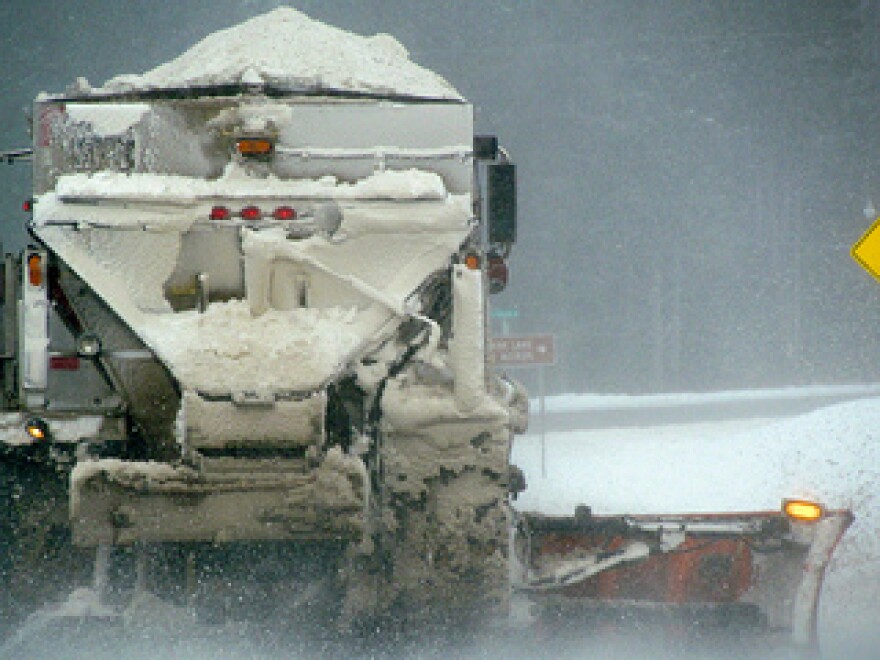A New York environmental group says the use of fracking waste on some of the state’s roads is occurring more than initially thought. The state agency that regulates the use of fracking brine says it ensures the waste does not have high concentrations of pollutants.
Kate Hudson is watershed program director for environmental group Riverkeeper. She says she found information about the use of fracking waste to de-ice some of New York’s roads while working with local groups in Westchester, Orange, Putnam, Rockland, and Albany Counties to ban the use and disposal of fracking waste. She says while advocating for county-level bans:
“We stumbled on the fact that the brine spreading was occurring and that this was something that we thought it was occurring, said Hudson. “We did not know the extent to which it was occurring.”
She adds, “People in New York should not be lulled into a sense of, well, we’re not facing the risks of fracking right now because fracking isn’t being allowed in New York.”
New York has a moratorium on high-volume, hydraulic fracturing and is awaiting Governor Andrew Cuomo’s decision on whether to ban the method of extracting natural gas from shale formations. A spokesman for the governor recently said the matter is under review by the state Department of Environmental Conservation and state Department of Health, with no set timeline for a decision. Again, here’s Riverkeeper’s Hudson on fracking waste for road de-icing.
“This is an activity that is related to low-volume, vertical well fracking waste, which is being generated that fracking activity in both New York and Pennsylvania in low-volume wells,” Hudson says. “That fracking activity is already allowed.”
It’s up to the New York State Department of Environmental Conservation to approve the use of fracking brine for roads in the state, and Riverkeeper, through the Freedom of Information Law, requested documents pertaining to such approvals. Hudson explains that those who want to use the waste as a de-icer have to apply to DEC for a Beneficial Use Determination – or BUD.
“So we FOILed DEC for all of the Beneficial Use Determinations they had issued in the last two years for the use of fracking brine on state, county, or local roads,” Hudson said.
She’s says amid the 500 pages or so in return, here’s what she found.
“There are BUD approvals being given by DEC for the spreading of brine from fracked wells and also, we found, which was not initially on our radar screen, brine from gas-storage facilities and that there are 30 BUDs that have been approved over the last two years for brine from those two sources to be used in 26 municipalities in six New York counties,” Hudson said.
Counties, she says, in the Southern Tier and western portion of the state.
A DEC spokeswoman says the agency currently issues Beneficial Use Determinations for production brine from primarily non-shale vertical oil and gas wells, and brine from solution mined salt caverns. She says under a BUD, designated road-spreading locations must avoid environmental impacts to sensitive locations such as state forest areas, wetlands, and surface water bodies.
When New York State Senator Terry Gipson heard about Riverkeeper’s report, he renewed his call for legislation he introduced earlier this year.
“We have a bill in committee right now that would ban the use of fracking wastewater as a de-icer in New York State, and we hope that my colleagues will see that this activity actually is occurring here in New York State,” Gipson said.
His bill has three co-sponsors, all fellow Democrats.
“The idea that we are going to go out and let it be poured on our roads and our bridges, which often go over our water resources, is just ridiculous. It’s going into the yards where our children play; it’s going into the farmland where we grow our food; and it’s going into the water that we use to drink and irrigate our crops,” says Gipson. “And it’s irresponsible behavior and we need to stop it.”
Hudson points to current concerns about high levels of salinity and low levels of two chemicals. The DEC spokeswoman, in reference to Riverkeeper’s blog on fracking waste, says, in a statement, if excessive levels of petroleum-related volatile contaminants such as benzene and toluene are found, DEC will deny a beneficial use request. The statement also says that high levels of sodium chloride and/or calcium chloride are expected, and are, in fact, required, for the brine to be useful for road de-icing or road stabilization.
UPDATE: A DEC spokeswoman brine from high-volume hydraulically fractured wells, commonly known as fracking, is not allowed to be used as road de-icer in New York State. DEC reviews the use of brine from other sources on a case-by-case basis to avoid environmental impacts to sensitive locations such as state forest areas, wetlands and surface water bodies. Brine has been used for decades to de-ice roads.







